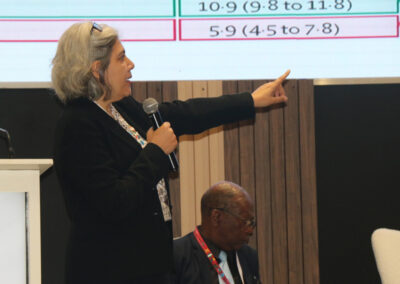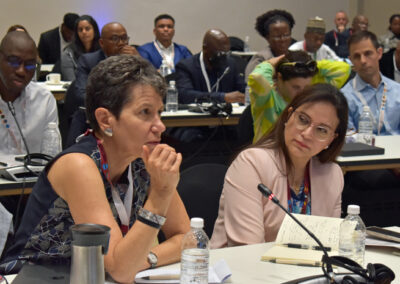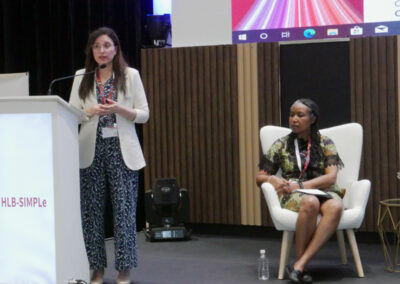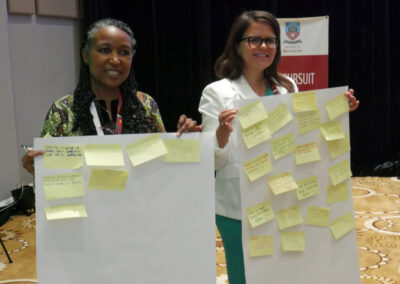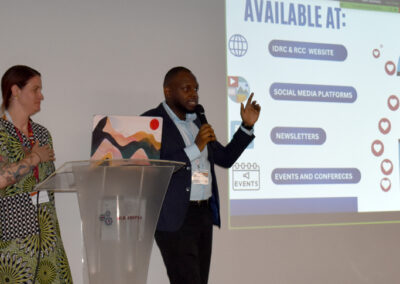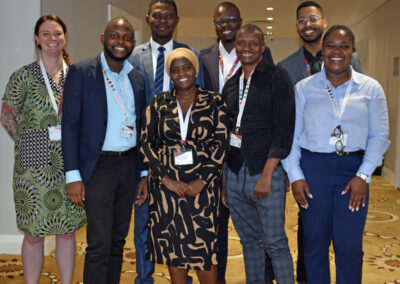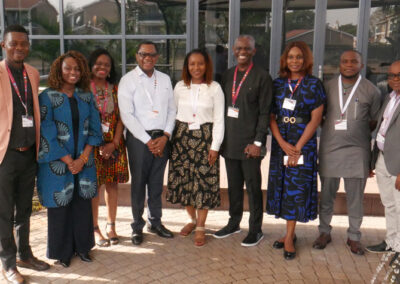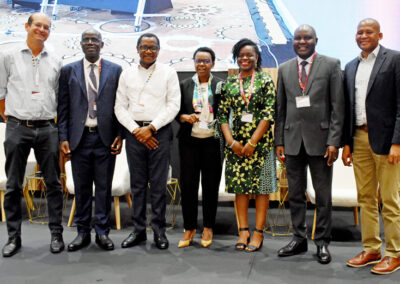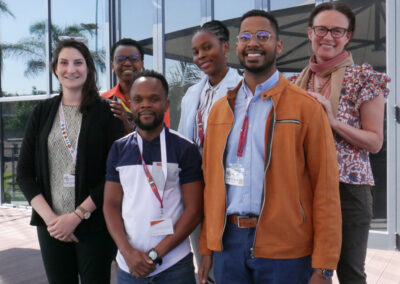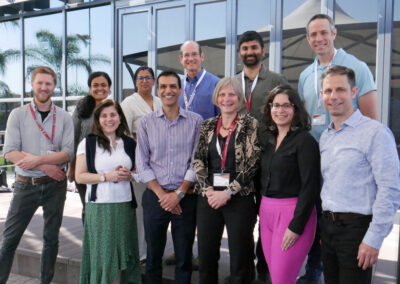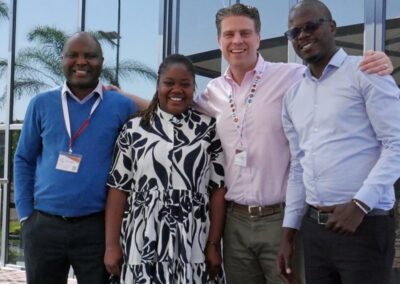Representatives from all six research teams, the RCC, and the NHLBI gather in Gaborone, Botswana, for the HLB-SIMPLe Annual Meeting in May 2024. (PHOTO: RCC/April Houston)
Written by Elvin Geng and April Houston.
The 2024 HLB-SIMPLe Alliance Annual Meeting was held in Gaborone, Botswana, bringing together representatives from all Alliance projects to share implementation progress and lessons learned, to troubleshoot challenges and celebrate successes, and to foster connectedness between Alliance members, collaborators, and communities affected by HIV and non-communicable diseases. The agenda was full of informative presentations, panel discussions, workshops, and exercises to promote strategic thinking and planning.
A unique multi-sectorial conversation unfolded at the intersection of policy and practice. Mike Reid, Chief Scientific Officer of PEPFAR, delivered a keynote presentation emphasizing the strategic evolution of PEPFAR beyond the 90-90-90 targets. He stressed that their focus is not only on securing achievements in HIV/AIDS control but also on expanding their scope to incorporate broader health and development agendas. This shift toward strengthening health systems and broadening partnerships is vital for sustained improvements across various health sectors.
WHO representatives Nathan Ford and Mukta Sharma detailed how outcomes from HLB-SIMPLe studies will go into shaping global health policies. They announced WHO’s upcoming guidance on integrated health services, utilizing existing HIV-focused infrastructure to enhance broader health systems, expected by the end of 2024. This initiative is crucial as it represents a broader strategy to ensure that HIV investments can be effectively integrated into general health services, reflecting a proactive approach in bridging the gap between policy planning and implementation.
Nathan Ford and Mike Reid
Nathan Ford (WHO) and Mike Reid (PEPFAR) answer questions from the audience at the 2024 HLB-SIMPLe Annual Meeting.
Lisa Hirschhorn and Maliha Ilias
Lisa Hirschhorn asks a question at the 2024 HLB-SIMPLe Annual Meeting while Maliha Ilias (NHLBI) looks on.
Maliha Ilias and Angela Brown
Maliha Ilias (NHLBI) speaks about NIH’s community engagement priorities at the 2024 HLB-SIMPLe Annual Meeting while Angela Brown looks on.
Angela Brown and Leah Neubauer
Drs. Angela Brown and Leah Neubauer hold flip chart paper with various definitions of community on them at the Community Engagement Workshop at the 2024 HLB-SIMPLe Annual Meeting.
Byron Biryaho presents
Byron Biryaho gives a presentation at the 2024 HLB-SIMPLe Annual Meeting while April Houston looks on.
2024 Science Communication Cohort trainees
The Science Communication Cohort trainees with coordinator April Houston (far left) pose for a photo at the 2024 HLB-SIMPLe Annual Meeting.
MAP-IT team
Representatives from the MAP-IT Nigeria team gather in Gaborone, Botswana, at the 2024 HLB-SIMPLe Annual Meeting.
HLB-SIMPLe investigators
HLB-SIMPLe investigators Francois Venter, Fred Semitala, Dike Ojji, Ana Mocumbi, Angela Aifah, Wilbroad Mutale, and Mosepele Mosepele.
SCALE SAIA-HTN team
Representatives from the SCALE SAIA-HTN Mozambique research project pose for a photo in Gaborone, Botswana, at the 2024 HLB-SIMPLe Annual Meeting.
iHEART team
Representatives from the iHEART-SA South Africa research team came to Botswana for the 2024 HLB-SIMPLe Annual Meeting.
Many vibrant scientific discussions happened throughout the meeting that clearly linked emerging science to both local and global health priorities and policy planning. The event included a networking café activity, facilitating a series of one-on-one meetings among Alliance members and with invited guests, enhancing existing connections and encouraging new collaborations. There was also a community engagement workshop where participants were encouraged to reflect on how their research teams might build stronger, more equitable relationships with stakeholders in their communities.
The costing, cost-effectiveness, and data harmonization subcommittees met multiple times over the course of the meeting and succeeded in developing a list of 10 common strategies and four common mediators of interventions to integrate HIV and hypertension care (which can, in turn, be associated with specific doses and costs). The team also agreed on a primary effectiveness outcome for a harmonized cost-effectiveness analysis. These decisions will lay a solid foundation for performance of cost and cost-effectiveness analyses across all six sites as data are finalized over the coming year.
Participants from various training programs led by the HLB-SIMPLe Research Coordinating Center were invited to give presentations at the meeting, describing the work they had done or were planning to do to practice the skills they were being trained on. Although many were intimidated at first, many left the meeting feeling like it was a positive experience and valuable for advancing their thinking and their work.
“I absolutely loved the meeting! It was such an eye-opening experience!” shared Eunice Mopane, a trainee in the RCC’s Science Communication Cohort and communications officer with Ezintsha, the organization managing HLB-SIMPLe’s project in South Africa. “I particularly enjoyed hearing diverse perspectives on topics I hadn’t considered before. The warm welcome from everyone made me feel included and valued.”
Brian Banda, pharmacy liaison officer with the TASKPEN Zambia project also enjoyed his time at the meeting. “I learned a lot from the social interactions (networking) as well as the interactive sessions, especially on community engagement. I now recognize and appreciate the relationship between effective science communication and true meaningful community engagement. When done right, I think it can greatly impact research interventions and programs and may serve as a catalyst for changing policies, programs, and practices.”
Given this time of connection and inspiration, the Alliance is now poised to work even better together, enhancing the speed and significance of our progress.
HLB-SIMPLe is funded by the Center for Translation Research and Implementation Science at the National Heart, Lung, and Blood Institute (NHLBI) and the Fogarty International Center at the US National Institutes of Health (NIH).


